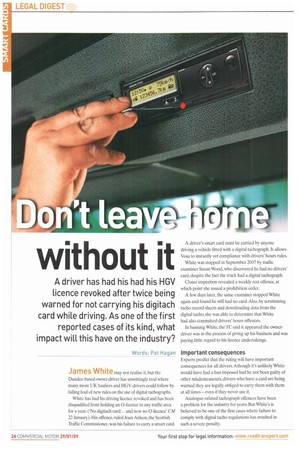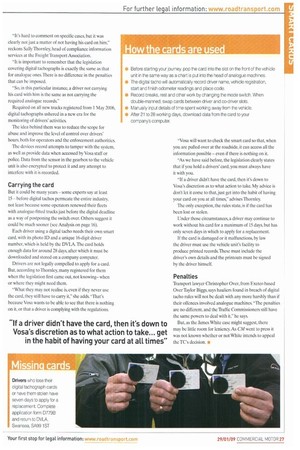A driver has had his had his HGV Licence revoked
Page 26

Page 27

If you've noticed an error in this article please click here to report it so we can fix it.
after twice being warned for not carrying his digitach card while driving. As one of the first reported cases of its kind, what impact will this have on the industry?
James White may not realise it, but the Dundee-based owner-driver has unwittingly trod where many more UK hauliers and HGV drivers could follow by falling foul of new rules on the use of digital tachographs White has had his driving licence revoked and has been disqualified from holding an 0-licence in any traffic area for a year. ("No digitach card... and now no 0-licence' CM 22 January). His offence, ruled Joan Aitken, the Scottish Traffic Commissioner, was his failure to carry a smart card. A driver's smart card must be carried by anyone driving a vehicle fitted with a digital tachograph. It allows Vosa to instantly vet compliance with drivers' hours rules.
White was stopped in September 2007 by traffic examiner Susan Wood, who discovered he had no drivers' card, despite the fact the truck had a digital tachograph.
Closer inspection revealed a weekly rest offence, at which point she issued a prohibition order.
A few days later, the same examiner stopped White again and found he still had no card. Also, by scrutinising tacho record sheets and downloading data from the digital tacho, she was able to determine that White had also committed drivers' hours offences.
In banning White, the TC said it appeared the ownerdriver was in the process of giving up his business and was paying little regard to his licence undertakings.
Important consequences
Experts predict that the ruling will have important consequences for all drivers. Athough it's unlikely White would have had a ban imposed had he not been guilty of other misdemeanours, drivers who have a card are being warned they are legally obliged to carry them with them at all times — even if they never use it.
Analogue-related tachograph offences have been a problem for the industry for years. But White's is believed to be one of the first cases where failure to comply with digital tacho regulations has resulted in such a severe penalty. "It's hard to comment on specific cases, but it was clearly not just a matter of not having his card on him," reckons Sally Thornley, head of compliance information services at the Freight Transport Association.
"It is important to remember that the legislation covering digital tachographs is exactly the same as that for analogue ones. There is no difference in the penalties that can be imposed.
"So, in this particular instance, a driver not carrying his card with him is the same as not carrying the required analogue records."
Required on all new trucks registered from 1 May 2006, digital tachographs ushered in a new era for the monitoring of drivers' activities.
The idea behind them was to reduce the scope for abuse and improve the level of control over drivers' hours, both for operators and the enforcement authorities.
The devices record attempts to tamper with the system, as well as provide data when accessed by Vosa staff or police. Data from the sensor in the gearbox to the vehicle unit is also encrypted to protect it and any attempt to interfere with it is recorded.
Carrying the card
But it could be many years some experts say at least 15 before digital tachos permeate the entire industry. not least because some operators renewed their fleets with analogue-fitted trucks just before the digital deadline as a way of postponing the switch over. Others suggest it could be much sooner (see Analysis on page 16).
Each driver using a digital tacho needs their own smart card, with its photo ID and a unique 16-digit driver number, which is held by the DVLA.The card holds enough data for around 28 days, after which it must be downloaded and stored on a company computer.
Drivers are not legally compelled to apply for a card. But, according to Thornley, many registered for them when the legislation first came out, not knowingwhen or where they might need them.
"What they may not realise is, even if they never use the card, they still have to carry it," she adds. "That's because Vosa wants to be able to see that there is nothing on it, or that a driver is complying with the regulations. "Vosa will want to check the smart card so that, when you are pulled over at the roadside, it can access all the information possible even if there is nothing on it, -As we have said before, the legislation clearly states that if you hold a drivers' card, you must always have it with you.
"If a driver didn't have the card, then it's down to Vosa's discretion as to what action to take. My advice is don't let it come to that, just get into the habit of having your card on you at all times," advises 'Thornley.
The only exception, the rules state, is if the card has been lost or stolen.
Under those circumstances, a driver may continue to work without his card for a maximum of 15 days, but has only seven days in which to apply for a replacement.
If the card is damaged or it malfunctions, by law the driver must use the vehicle unit's facility to produce printed records.These must include the driver's own details and the printouts must be signed by the driver himself.
Penalties
Transport lawyer Christopher Over, from Exeter-based Over Taylor Biggs, says hauliers found in breach of digital tacho rules will not be dealt with any more harshly than if their offences involved analogue machines, "The penalties are no different, and the Traffic Commissioners still have the same powers to deal with it," he says.
But, as the James White case might suggest, there may be little room for leniency. As CM went to press it was not known whether or not White intends to appeal the IC's decision. •
























































































































































